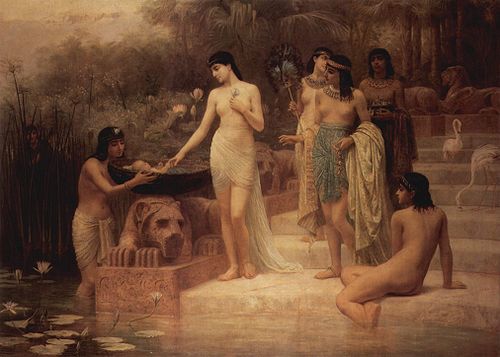I discuss the weekly Torah portion with Rabbi Rabbs Mondays at 7:00 pm PST on my cam and on YouTube. Facebook Fan Page.
This week we study Parashat Shemot (Exodus 1:1-6:1).
* Is it good for the Jews to have a full service Asian ecstasy massage parlor next to the shul? Why do so many Jewish men go for Asian women? What happens to a house of God when it is located next to a house of prostitution?
* How does one overcome Captain SaveAHo tendencies? When I find a cute woman in prostitution or stripping or nude modeling, I want to save her, but many of these women don’t want to be saved and all that happens is that I get lost in a miasma of sin.
* Why do some Orthodox Jews want women to sit at the back of the bus? How is this different from racial segregation?
* Haredi violence in Beit Shemesh catches Israel’s attention
* Without divine intervention, the Denver Broncos would’ve won how many games this year? Could God use a Christian NFL quarterback for holy purposes?
* After seeing what God did to Pittsburgh Steelers on Sunday, I’m now convinced HaShem intervenes in our daily lives and I am afraid to keep sinning.
* Rabbi Berel Wein writes: “We hear nothing regarding Moses for the next sixty years until he reemerges as a shepherd in Midian, married to the daughter of Yitro, the local religious chief who, at this time, is still a pagan. Hardly the resume’ that one would expect for the leader of Israel, the greatest of all prophets and the teacher of all human kind.”
Many of the great leaders of the Jewish people have wandered in the wilderness for years consorting with pagans. For instance, I know of this blogger who was lost in the San Fernando Valley for more than a decade and then became a moral leader.
* Here’s a beautiful description of Pharaoh’s daughter finding Moses in the Nile (1886 painting by Edwin Long). My own rescue happened similarly when a pack of nubile babes descended upon as I took a swim.

* “Where did his holiness and greatness stem from, how was it developed, who were his mentors and what were his experiences over those long decades of separation from his people?”
No, those words were not written about me but about Moses.
“The Torah gives us no clue or answer to these questions. It effectively points out that greatness oftentimes comes from unexpected sources and from people and leaders who operate outside of the usual establishment circles.”
* A man on the subway asked the bloke next to him for the time. The bloke did not answer. The man kept pestering him and finally forced him to answer. “I did not answer you,” said the Jewish bloke, “because I foresaw that if I answered you, you would say something and then I would say something and eventually you’d want to marry my daughter and I don’t want my daughter to marry a guy who doesn’t have a watch.”
The wise man foresees the consequences of his actions.
* How much has our life been influenced by our name? I believe my life has been shaped by my having been named “Luke Ford.” It’s a superstar name. My Hebrew name is Levi Ben Avraham and when I’m called Levi, that brings out a whole different side of me. When I’m called baby, that also brings out a different side of me. And when I’m called “Oh, Luke, Luke, Luke!”, that brings out a different side of me.
* The Levites and the priests were set aside from the rest of the Jewish people just as the Jews are set aside from the rest of humanity.
* I was hanging out with a friend from childhood the other day. I kept calling him “goy”. I asked him to carry my bags. I stuck him with the bill for lunch. He finally got a bit tired of this treatment. I explained that one of the few benefits of being an Orthodox Jew is that you have a hechsher to be what the goyim might call a bigot. Because your life has significantly narrowed thanks to the observance of Jewish law (which makes it difficult to fraternize with non-Jews and non-observant Jews), it’s easy to view the outside world as only good for business. The life of the Orthodox Jew is demanding but at least you get to look down on everyone else. Not all Orthodox Jews do look down on others, maybe not even most, but I’ve found that every insular community I know well tends to look down on the outside world.
I believe this type of “bigotry” is largely harmless in Orthodox Judaism because you never do anything to harm anyone in the wider world. You just might think that others are less disciplined and less smart and less moral than you. It can be an intoxicating feeling of superiority. Perhaps it is wrong and a shameful interpretation of the Jewish tradition but it’s a lot of fun and I enjoy riding this wave at times, but then again, I am a bad man.
* If God ever asks me to be the king of the Jews, I won’t protest like Moshe did. I’ll just say, here I am, Lord. What shall I blog?
